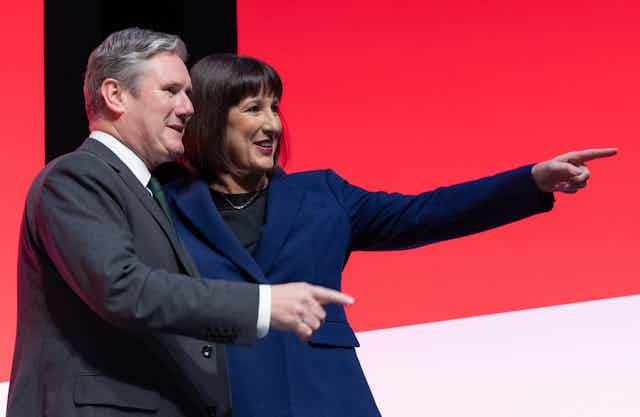To say that the Labour party is flying high in the polls is something of an understatement. But despite its consistent lead against the Tories, the opposition finds itself in a rather odd position: on the cusp of power but without a clear transformative vision of what it will actually do in office.
The risk is that Labour will win but also lose the next general election. It may win in the sense of gaining a large majority, but it may also quickly lose public support due to the absence of any defining vision and associated policy programme capable of transforming people’s lives.
A win under this scenario is effectively by default. A disillusioned public appears to be ready to vote for the other side because they think the party of government has run out of puff. But that public can quickly become disillusioned with Labour if it fails to address the structural weaknesses that blight people’s lives. To stay in power, Labour needs to deliver quickly.
Labour has five missions as its election pledge but no real vision of how it will achieve these goals. “Getting the NHS back on its feet” or “breaking down barriers to opportunity” means addressing deeply embedded systemic inequalities with transformative “big thinking”.
A wealth of research shows just how much change is needed. The economy is damaged, pressures on households are immense and basic public services are in crisis. The value of work has declined relative to the value of wealth, with the economic security of those in work reducing as costs of housing, energy and food have increased.
People recognise that the uncontrolled costs of essential goods are now the greater threat to spending power than small tax rises, and yet employment models have become increasingly precarious. Disaffection with democracy among young people is understandably high.
Rachel Reeves, the shadow chancellor, has promised that Labour “will embrace securonomics” as a response to what economist Guy Standing in 2018 labelled “the rise of the precariat”. Reeves argued that “no democratic government can be content with a lack of decent work, falling wages and the dimming of people’s hope for a better life.”
The shadow chancellor has also called for a “fundamental course correction” when it came to economic policy making. There is every reason to agree – the current course is not working and Liz Truss’s period in office tested to destruction taking that course to its logical conclusion with further tax cuts for the wealthy.
Yet Labour has rejected substantive tax and spend policies and it’s this policy myopia that arguably explains its vision void.
‘Financial competence’
Labour’s wish not to spook the markets is understandable. It is adopting a fiscally conservative position to allay longstanding concerns about economic competency. But at the same time tying its own hands so tightly risks undermining the ability of any future Labour government to deliver transformative change.
As many studies show, simply focusing on “more growth” is too simple, because the benefits tend not to trickle down effectively to large parts of society. When it comes to transforming society there are no cheap solutions that avoid tax and spend.

Labour’s lack of vision is, from this perspective, perplexing. Reeves states that the first error of economic policymaking in recent year has been a “fundamental under-appreciation of the role of government” – an error which “dictated that a government’s primary economic imperative should simply be to get out of the way of free enterprise”.
Yet Labour remains resolute in not committing to tax increases beyond closing some tax loopholes for the super rich. The risk the party is taking is that by emphasising financial competence with the markets it sacrifices visionary potential with the public.
A chance to be bold
In the wake of COVID, Brexit and now the cost of living crisis, a window of opportunity has opened which does allow the Labour Party to be far bolder. People recognise exposure to increased risk of destitution in light of insecure employment and disappearing health and social safety nets. The part played by government in securing people’s lives and livelihoods during the pandemic reminded citizens that the state can intervene effectively to mitigate risk.
There is reason to believe those intending to vote Labour and a significant block of around 17% of the public who are still undecided on their voting intentions express extremely high levels of support for policies that require tax and spend.
Evidence on this is mounting. In a forthcoming book, the cross-party Common Sense Policy Group present a body of demographic, socioeconomic and public opinion evidence from a survey of 1,052 national and 851 red wall constituency voters. The book sets out a policy programme, including nationalisation of public utilities and a green new deal, that is consistent with Labour’s commitment to achieving economic stability, but requires major public investment.
The underpinning data indicate that annual progressive wealth taxes on those with assets over £2 million, increasing corporation tax to German levels, taxing carbon and fossil fuel production and removing a tranche of reliefs (collectively producing additional yields of over £340 billion per year), as a package, has an average approval rating of 72.6%
This includes approval of 66% among those who don’t yet know how they will vote this year and 76% among those intending to vote Labour. Approval is 70.8% in the red wall, including 61.7% among people in the region who voted Conservative in 2019 and 82.8% among those who voted Labour.
This supports the notion that tax and spend, done openly and strategically, and without significantly increasing income tax on low-middle earners, has the support of the British public.
With this public support for major public investment running high, Labour has an opportunity to deal with its vision void and set out a more ambitious economic policy.

